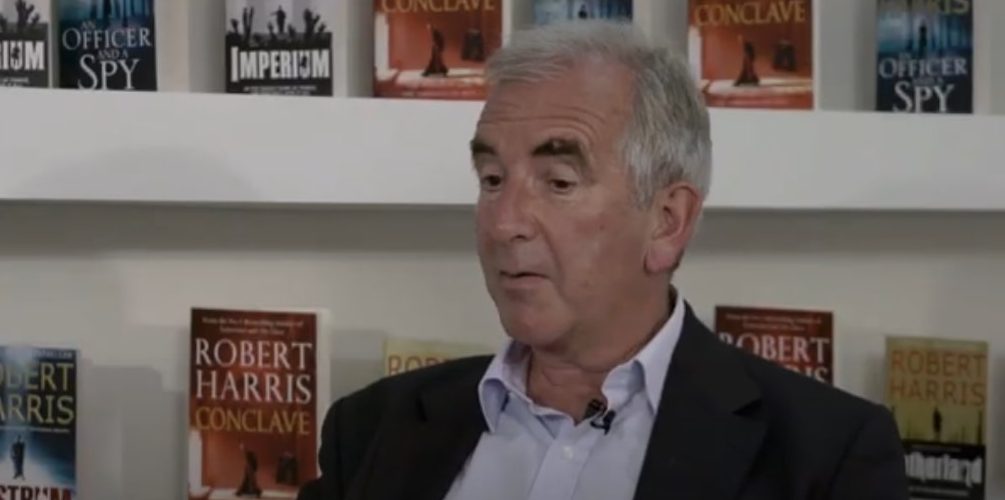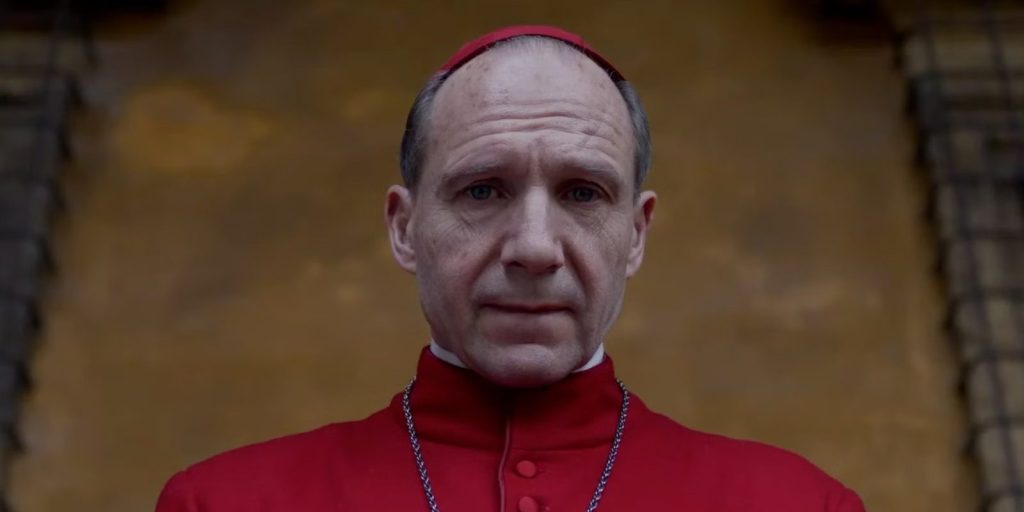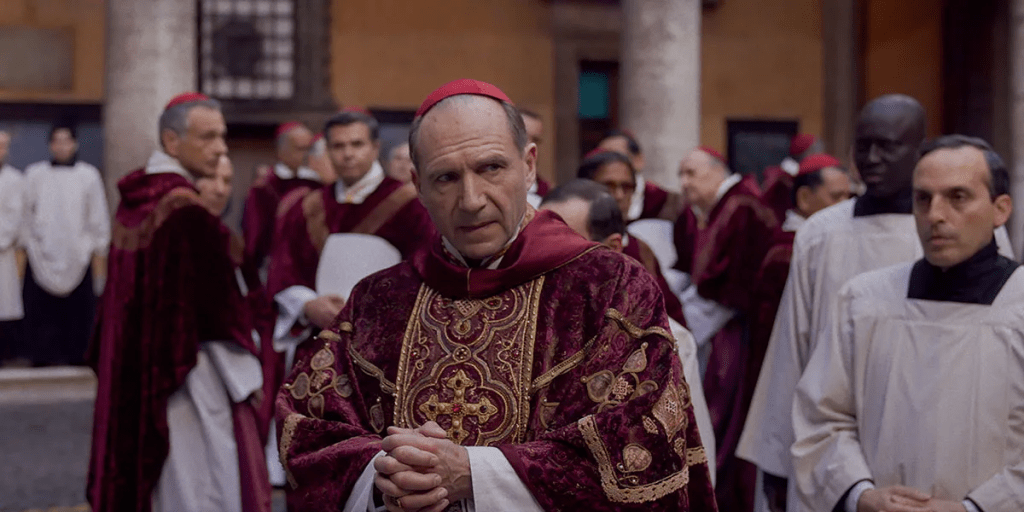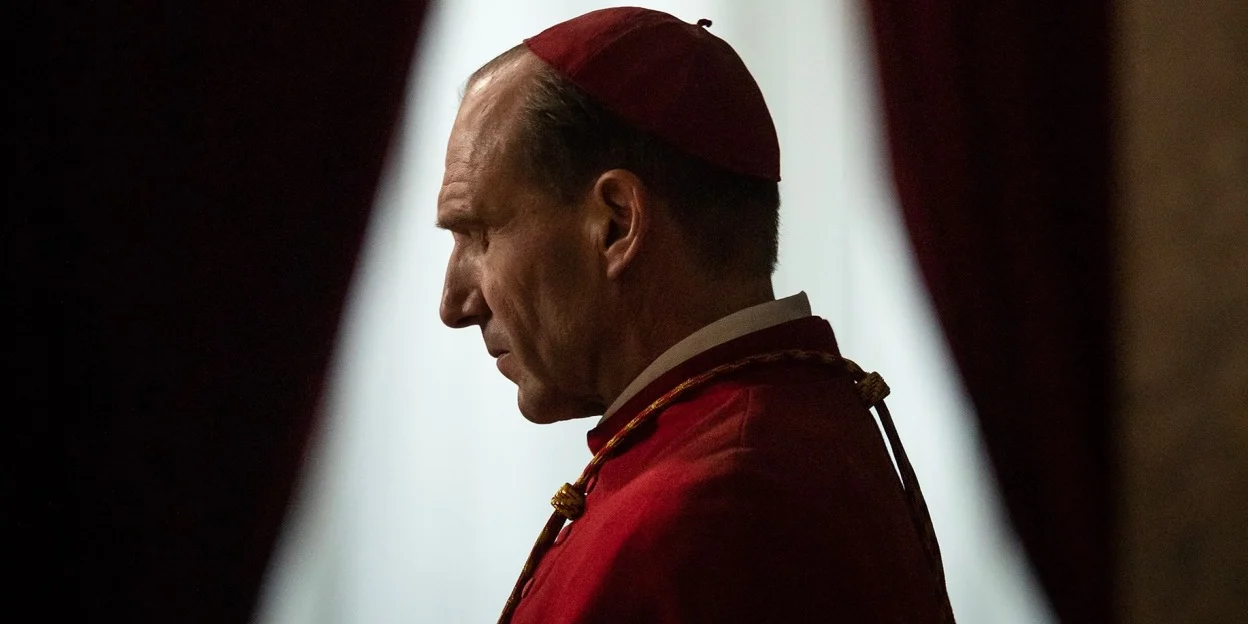Directed by Edward Berger, ‘Conclave’ is a Vatican thriller centered on a papal conclave that throws up a variety of secrets about each candidate in the aftermath of the pope’s death. The movie is told through the eyes of Thomas Lawrence, a liberal British cardinal who is responsible for organizing the conclave and ensuring the right person ascends to the throne. However, his invidious position leads him to investigate each candidate’s legitimacy and whether their reputations are as squeaky clean as advertised. Although primarily dictated by the Christian worldview, the film explores more holistic themes of politics, equality, faith, morality, and the search for an ideal leader in a world brimming with imperfections.
Conclave is an Adaptation of a Thriller Novel That Explores Religion and Politics
‘Conclave’ is a fictional story based on the eponymous 2016 novel penned by Robert Harris, which delves into the complexities of the Vatican elections through the intersectionality of religion and politics. Written by Peter Straughan, the film adapts the original source material in a largely faithful manner, changing a few dynamics like the protagonist’s nationality from Italian to British. Still, the narrative’s power and resonance lie in its ability to incisively portray the world of spirituality through a more gray perspective, which is often epitomized through the choices available within the story. The Edward Berger directorial repeatedly underpins its themes against a feeling of the lesser of two evils, especially as roles of authority and power are up for grabs.

According to Harris, the story’s central driving force can be boiled down to an exploration of how society is sometimes imperfect and unsolvable. As decisions are made, more fallacies and flaws come to the fore, while the necessity to carry on anyway takes precedence. In doing so, it highlights a difficult problem – when can one voice their concerns about someone’s political legitimacy and whether there is a better alternative in place? In an interview with TIME, the novelist explained, “I have a lot of time for politicians, just as I have a lot of time for these cardinals, because they are grappling with almost insoluble problems. But someone has to do it. Someone has to run a society. And I’ve tried to write about them with a degree of sympathy.”
Through ‘Conclave,’ the author wished to underline a narrative that was “the ultimate election, the ultimate political story.” However, despite its mainly fictional conception, Harris acknowledged taking inspiration from history when conjuring some of the religious drama at the heart of the story. This extends to the character of Cardinal Aldo Bellini, whose liberal stance and inability to be elected are loosely rooted in Carlo Maria Martini’s experiences when he lost out on the 2005 Papal Conclave despite being considered a favorite prior to the elections. Harris also took some inspiration from an alleged diary chronicling how a cardinal sought to stop Cardinal Joseph Ratzinger’s elevation to Pope Benedict XVI. Thus, a variety of real-life events helped shape the story contextually, adding to the realism.
Conclave Delves Into the Complexities of Power
When transposing the novel to the movie, director Edward Berger wanted to capture the universality of the story’s message, regardless of its setting and environment. To that end, the religious underpinnings of the narrative were incidental to the filmmaker, mainly as its exploration of power and authority could be applied to any industry and at any level of society. However, crafting such a thematic project posed the requirement of creative discipline and the ability to pare back when necessary, especially as the main crux of the film had to be simple and digestible. Thus, the movie hinges on a variety of factors, the most prominent of which can only be personified through characters and the complex choices they are presented with.

The director said in an interview, “To me, it takes place in the Vatican, but it really could take place anywhere. It could take place in Washington, D.C. It could take place in Downing Street. It could take place in any CEO top job. This is basically, let’s see it as a gig that is empty, a vacant throne, a vacant position and someone needs to fill it.” The idea behind the film is to pull back the curtain and dive into how power vacuums can create a race to the bottom while catering to the egos at the top. As the ambitious see themselves filling the spots of authority, those who fear to lead have to curtail their emotions and look deep within themselves to realize their responsibilities in a time of need.
Considering the profoundly challenging problems faced by the protagonist, it is understandable that a crisis of faith can occur at any time. In another interview, Berger stated that it reflects the contemporary world and the issues people face today, saying, “We’re all in a moment of crisis once in a while, we have our problems, we lose faith in ourselves, in the world.” Naturally, these inner insecurities manifest in a negative outlook and a general pessimism about the future. However, it also acts as a call to action for people and the need to spread positivity and resolve in society in general. ‘Conclave’ does this by reinforcing the need for spirituality and faith in a time where not a lot of it exists.
Thomas Lawrence is a Fictional Cardinal Detached From Reality
While ‘Conclave’ is littered with interesting characters, its central heartbeat lies in Cardinal Thomas Lawrence, the protagonist whose neutrality during a papal election offers a sense of objectivity to the story. He is a fictional character conceived by scriptwriter Peter Straughan, based on Cardinal Jacopo Baldassare Lomeli, the protagonist of the source novel. Unlike Lawrence, Lomeli is an Italian Cardinal whose allegiance lies primarily with his friend Aldo Bellini. While the two characters differ in nationalities, their character traits and backstories are largely identical. Both are the Dean of the College of Cardinals and responsible for organizing the papal conclave in the aftermath of the pope’s death. The two also disregard being elected as pope, considering themselves unworthy of the post.

As Lawrence is removed from any political objective or agenda to be appointed as supreme pontiff, he is able to influence the elections in a manner that does not corrupt its overall integrity. However, he does play a significant role in indirectly deciding the victor by investigating a variety of secrets and underlying games played by some of the candidates in the elections. His detachment from gaining power also leads him to gain popularity among other cardinals within the Conclave, the most notable of whom is Cardinal Vincent Benitez. The Mexican cardinal of Kabul considers Lawrence a worthy suitor for the role of pope because of his modesty and his blatant admittance that he has no obsession with being head of the church.
However, later in the story, Lawrence finds it harder and harder to ignore his responsibility to contest the elections in a proper manner, mainly because the papacy seems to be heading toward Cardinal Goffredo Tedesco. Because the Italian fundamentalist plans to return the church to a more authoritarian past, where social reforms were almost nil or non-existent, Lawrence cannot accept sitting back and allowing such a change to occur. Still, it is clear from the outset that his desire to be a pope is not personally driven and more affiliated with a desire to serve the church in a manner that is befitting of God. Therefore, his underlying motivations and duties create a more three-dimensional picture of the ecclesiastical figure despite being fictional in conception.
Read More: Where Was Conclave Filmed?


You must be logged in to post a comment.